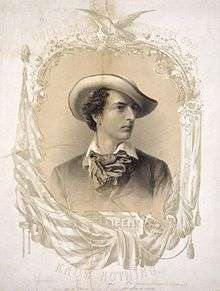Old Stock Americans
| Regions with significant populations | |
|---|---|
| United States of America | |
| Languages | |
| American English | |
| Religion | |
| Christianity (Primarily Protestantism)[1] | |
| Related ethnic groups | |
| Old Stock Canadians, British, French, Dutch, Germans, and Irish |
Old Stock Americans (Also known as Old Pioneer Stock) are an ethnic group descended from the original settlers of the Thirteen Colonies[2] who immigrated between the 17th and 18th centuries.[3][4][5][6][7][8] Up until the late 20th century, Old Stock Americans dominated American culture and politics.[9][10] Thousands of Germans and Irish immigrated to the United States during the 19th century and were met with strong opposition from the majority Protestant Old Stock, who were anti-immigration and anti-Catholic.[11][12] The famous Know Nothing Party.[13] was dominated by Old Stock Americans who believed Catholic immigrants were a threat to traditional American republican values and were loyal to the Papacy.[14][15] Many Old Stock Americans supported Prohibition in the early 20th century.[16]
Old Stock Americans were major proponents of Eugenics in the United States, believing they were apart of a genetically superior "Nordic race". Many Old Stock believed in racial suicide, as thousands of European immigrants were coming in droves to the United States[17] and they feared they would be out-bred.

History
A distinct American ethnic identity was formed in the Thirteen Colonies due to intermarriage between different ethnic groups, such as the English, French Huguenots, Ulster Scots, Dutch, Swedes, Welsh, and Germans, and distance from Britain[18][19][20]
References
- ↑ Greenblatt, Alan. "The End Of WASP-Dominated Politics". npr.org. Retrieved 14 July 2016.
- ↑ "Boundless U.S. History: Immigration". Boundless.com. Retrieved 16 July 2016.
- ↑ Brookhiser, Richard. "Way of the Wasp: How It Made America, and How It Can Save It, So to Speak". Free Pr. Retrieved 14 July 2016.
- ↑ "English Immigration to America". Retrieved 14 July 2016.
- ↑ McClymer, John F. "The KKK in the 1920s". Retrieved 14 July 2016.
- ↑ Limerick, Patricia Nelson. "The Legacy of Conquest: The Unbroken Past of the American West". W.W. Norton Company. Retrieved 14 July 2016.
- ↑ Hirschman, C. "Immigration and the American century". NCBI. Retrieved 14 July 2016.
- ↑ Khan, Razib. "Don't count old stock Anglo-America out". Discover Magazine. Retrieved 14 July 2016.
- ↑ Oyangen, K. "Immigrant Identities in the Rural Midwest, 1830--1925". Iowa State University. Retrieved 13 July 2016.
- ↑ Lichtman, Alan J. "Prejudice and the Old Politics: The Presidential Election of 1928". Lexington Books. Retrieved 13 July 2016.
- ↑ Byrne, Julie. "Roman Catholics and Immigration in Nineteenth-Century America". National Humanities Center. Retrieved 13 July 2016.
- ↑ "AN ANTI-CATHOLIC LAW'S TROUBLING LEGACY". Catholic League. Catholic League. Retrieved 13 July 2016.
|first1=missing|last1=in Authors list (help) - ↑ "The Know Nothing Party". Encyclopedia Britannica. Retrieved 12 July 2016.
- ↑ Berkin; Miller; Cherny; Gormly. Making America (6th ed.). Wadsworth Cengage Learning. Retrieved 12 July 2016.
- ↑ Endres, Fr. David J. "Sticks, Stones, and Broken Bones: The History of Anti-Catholic Violence in the U.S.". Homiletic and Pastoral Review. Retrieved 13 July 2016.
- ↑ Lichtman, Alan J. "Prejudice and the Old Politics: The Presidential Election of 1928". Iowa University Press. Retrieved 14 July 2016.
- ↑ Hochman, Adam. "Race suicide". Eugenics Archive.
- ↑ "What Is the American?". U.S. History. Retrieved 12 July 2016.
- ↑ "The Middle Colonies". ushistory.org. The Independence Hall Associatio.
- ↑ de Crevecoeur, J. Hector St. John. "Letters from an American Farmer". Davies and Davis. Retrieved 14 July 2016.